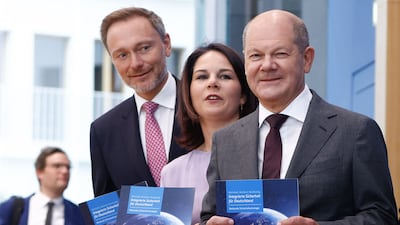Germany has blamed Iran for blocking a nuclear arms deal with world powers, in a new national security strategy published on Wednesday.
Iran's regional activities and its conventional missile programme are also “fuelling escalation”, it said.
The 76-page paper is Germany's first ever formal security strategy but it focuses relatively little on traditional defence and foreign policy issues outside Europe.
After Germany was caught out by its reliance on Russia in the energy sector, it calls for a new “360-degree perspective” that brings security thinking into science, health care and the economy.
However, it also warns of an erosion of arms control norms by Russia, North Korea and Iran.
“Iran is not only violating the human rights of its own citizens but also continues to pursue its nuclear ambitions, producing ever more highly enriched fissile material,” says the report signed off by Chancellor Olaf Scholz's cabinet on Wednesday.
Tehran has also “blocked efforts to revive the Joint Comprehensive Plan of Action”, it says, referring to the 2015 deal that lifted sanctions on Iran in exchange for curbs on its nuclear activities.
Iran has openly breached these limits since the US pulled out of the deal in 2018, for example by enriching uranium to a level that western powers say has no plausible civilian purpose.

Negotiations to restore the deal after Joe Biden replaced Donald Trump as President have stalled in recent months. It came as western ties with Iran were frayed by Tehran's links to the war in Ukraine and crackdown on dissent at home.
“In addition, Iran’s missile programme and its regional policy actions are fuelling escalation and may give rise to new regional proliferation momentum,” the German security blueprint said.
The document warns of continued instability linked to long-running conflicts in Syria, Libya and in Africa that it said were a “safe haven for violent non-state actors, including extremists”.
The threat of terrorism at home “is becoming greater due to radicalisation and experienced fighters returning from crisis zones and conflict areas,” it says.
“Although there have been major successes when it comes to combating terrorist organisations and extremist groups, these groups continue to exist and are increasingly forming international networks.”
The document – belatedly agreed after months of horse-trading within Mr Scholz's three-party coalition – says Germany will “continue to take on responsibility for Israel's right to exist” but otherwise makes no comment on the Middle East peace process.
Focusing on resilience at home, it calls for more sensitive technology to be made in Europe amid a push led by France for the EU to rely less on the US and China.

Also promised are new measures to guard against cyber attacks that could target the German government or key infrastructure such as hospitals.
After Germany ignored warnings about its pre-war gas trading with Moscow, future raw material deals will be scrutinised more closely through a national security lens.
There are pledges to expand civil preparedness, for example against chemical, biological, radiological and nuclear threats that “should not be neglected”.
Ministers are calling for the business and research sectors to ramp up their own cyber security as part of a “whole of society” rethink.
“Security in the 21st century is more than the military and diplomacy,” said Foreign Minister Annalena Baerbock, one of the ministers most critical of the actions of past German governments before the war in Ukraine.
“Security in the 21st century means reliably getting vital medicines from the pharmacy. Security means not being spied on by China while chatting with friends, or manipulated by Russian bots while scrolling through social networks.”
Germany is meanwhile upgrading a military that by general consensus has been left in a poor state after years of budget cuts following the end of the Cold War.
It hopes to meet the Nato target of spending 2 per cent of national income on defence in 2024, Finance Minister Christian Lindner said, an outlay which includes spending from a one-off €100 billion ($108 billion) borrowing spree to fund military upgrades.


